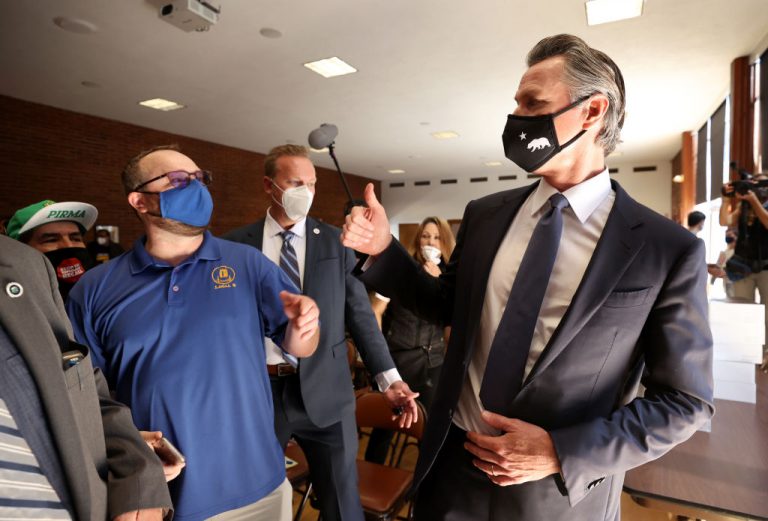California Governor Democrat Gavin Newsom emerged victorious in a recall election that sought to remove him from office. Leading opponent Republican Larry Elder said to his supporters that although they might have “lost the battle,” they will “win the war,” possibly hinting at election challenges in the future.
In the 2018 gubernatorial race, Newson was elected by the widest margin in an election since 1950. He was sworn in as the governor of California on Jan. 7, 2019. Many recall attempts were made early in his career, all of which never gained much traction. A recall petition introduced in Feb. 2020 went on to gain momentum, with the number of supporting signatures reaching one million by Jan. 2021.
Among the reasons cited in the recall, the attempt included Newsom’s favorable stance on illegal immigrants, high taxes in the state, high rates of homelessness, strict Coronavirus Disease 2019 (COVID-19) lockdowns, and so on.
In November last year, Newsom was criticized for going to a restaurant without wearing a mask, despite the fact that he had asked citizens to remain at home. The revelation that 31 billion dollars in state Employment Development Department funds aimed at helping citizens who lost jobs due to the COVID-19 pandemic went to scammers also hurt Newsom’s reputation.
Moreover, the governor allowed 76,000 prison inmates, including those who had committed violent crimes, to leave prison prior to their release dates. By Feb. 2021, the recall campaign accumulated 1.3 million signatures, which included around 300,000 registered Democrats. After the campaign received 1.5 million signatures, a recall election was announced.
Success
You are now signed up for our newsletter
Success
Check your email to complete sign up
The vote count is not yet final, as election officials have 30 days to count all ballots. However, with 60 percent ballots counted, it became clear that Newsom was the winner of the election.
According to the California Secretary of State’s Office, roughly 63.9 percent of the voters had voted “no” in the recall election, cementing Newsom’s position. The last time a governor was recalled in California was in 2003 when Arnold Schwarzenegger successfully challenged then-governor Gray Davis.
“Tonight, California voted NO on the recall and YES to… Science. Women’s rights. Immigrant rights. The minimum wage. The environment. Our future. We rejected cynicism and bigotry and chose hope and progress,” Newsom said in a tweet on Sept. 15.
In the election, Larry Elder received the most votes among Newsom’s challengers. During his campaign, Newsom had characterized a vote for Elder, an African American candidate, as a vote against “diversity” and “racial justice.” He called Elder “more extreme than Trump,” and insisted that the choice between him and his Republican challengers was one of “life and death.”
Newsom has made a number of false claims against Elder, accusing him of believing women are not as smart as men, and that slave owners should be paid reparations for freed slaves. Elder has also been a victim of racial attacks. A leader from the Black Lives Matter movement called Elder the “black face of white supremacy.”
Now that Newsom has survived the recall election, he will serve for one more year as the Governor of California until the next election arrives. In an interview with The Guardian, Dan Schnur, a politics professor who has advised Republican candidates, said that the recall election indicates that Californians are not looking for any dramatic changes.
Schnur believes that Newsom has further cemented his chances for re-election. “If he had survived by a small margin, it is very likely another Democrat would have run against him from the left next year… But given a landslide like this one, it’s very hard to see that happening,” Schnur said.
Meanwhile, California Democrats are calling for changes to the state’s recall election process. Democrat Senator Steve Glazer and Assemblymember Marc Berman said that they plan to hold bipartisan hearings by October to discuss the issue. The state’s recall system was established more than a century ago in 1911. Berman expressed hope that legislation on the matter would be introduced next year.
“Yesterday’s election highlighted the fundamentally undemocratic nature of California’s existing recall process… California laws should not allow an elected official to be recalled and replaced by someone else who receives far fewer votes,” Berman said in an announcement. The recall election has cost the state an estimated 300 million dollars.















